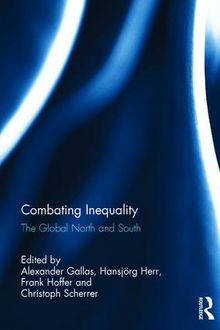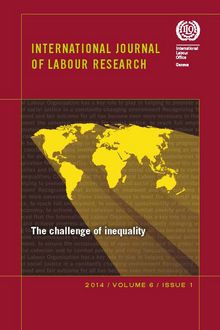Combating Inequality: The Global North and South
Edited by: Alexander Gallas, Hansjörg Herr, Frank Hoffer and Christoph Scherrer
Increasing economic and social inequality is one of the key features of the radical globalisation project that emerged in the 1970s, generating levels of inequality incompatible with social inclusion, equal opportunities and fairness. In a situation characterised by a severe financial and economic crisis, rising unemployment and reduced social expenditure are deepening the social divide in many societies. The Great Recession across the global north in 2009, followed by a very weak recovery (and in some cases a double-dip), has hit the most disadvantaged social groups hardest. At the global level, GDP growth has also slowed down.
The “combating inequality” project examines the causes of economic and social inequality, charts its development since the early 1990s, assesses countermeasures, works out strategies for their implementation, and identifies supportive social forces. It examines whether inequality in the national and the international context is undermining democracy and economic stability; and whether it is blocking individual and collective advancement as well as the creation of employment. The project is global in outlook and builds in particular on the expertise of the GLU partner institutions in Brazil, Germany, India and South Africa.
The project is divided into six thematic areas:
Research in the six areas is mainly carried out by drawing upon recent publications and statistics as well as building on the studies carried out within the GLU network. A gender mainstreaming strategy will ensure that the research conducted is gender-sensitive or at least gender-neutral.
Contributors to the project are producing articles that will be published as GLU working papers. Furthermore, there is going to be a GLU alumni report discussing the equality agenda of trade unions around the world. The research conducted will feed into a comprehensive report on how to combat economic inequality. This report will be presented at the GLU conference in May 2014 in Berlin and the International Labour Conference in June 2014 in Geneva. In addition, there will be an edited volume presenting key findings of the project, which will compile selected papers and case studies. This will be published in 2015.
Research in the six areas is mainly carried out by drawing upon recent publications and statistics as well as building on the studies carried out within the GLU network. A gender mainstreaming strategy will ensure that the research conducted is gender-sensitive or at least gender-neutral.
Contributors to the project are producing articles that will be published as GLU working papers. Furthermore, there is going to be a GLU alumni report discussing the equality agenda of trade unions around the world. The research conducted will feed into a comprehensive report on how to combat economic inequality. This report will be presented at the GLU conference in May 2014 in Berlin and the International Labour Conference in June 2014 in Geneva. In addition, there will be an edited volume presenting key findings of the project, which will compile selected papers and case studies. This will be published in 2015.
The research results of the project will be published in the form of GLU working papers, a report and an edited volume. The working papers will be made available on this page.

Edited by: Alexander Gallas, Hansjörg Herr, Frank Hoffer and Christoph Scherrer

The challenge of inequality ( in EN)
2014 | Volume
» Download (PDF | EN)
» Download (PDF | ES)
» Download (PDF | FR)
This project is funded by the Hans Böckler Foundation. We thank the Friedrich-Ebert-Foundation, the International Center for Development and Decent Work (ICDD), the International Labour Organization (ILO) (South-South and triangular cooperation) and the ILO (Bureau for Workers’ Activities) for their additional funding.
For additional information, please contact:
Project coordinator:
Berlin School of Economics and Law
» Bea Ruoff
Project leaders:
Berlin School of Economics and Law
» Prof. Dr. Hansjörg Herr
» Dr. Frank Hoffer
University of Kassel
» Prof. Dr. Christopher Scherrer